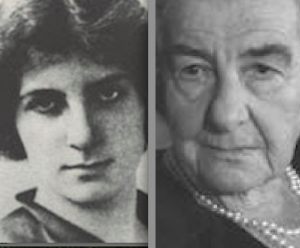Looking at world leaders, I often wonder when they decided to become political figures. It all seems so natural to them – decision-making, media coverage, public attention; but try to imagine them as children or teenagers, making the first steps towards a public career. Was Winston Churchill always so determined? Was Barack Obama a cautious child? Was Yitzhak Rabin an individualist, the boy who is never quite part of the group? Only rarely are we given the opportunity to follow the process of a person becoming a leader, overcoming profound psychological obstacles as he or she evolves into a prominent historical figure.
Golda Meir (1898-1978) had a brilliant political career, at a time when it was most unusual for women. She was elected Prime Minister of Israel in 1969, after serving as Minister of Labor and Foreign Minister. Only the third woman in the world to hold this office, she was perceived as a tough lady. David Ben-Gurion, the first Prime Minister of Israel, used to say she was “the best man in the government”; others called her “the grandmother of the Jewish people”.
She wrote an autobiography, titled My Life, a treasure for students of Zionism. I find its most interesting part to be the first-hand description of her youth, and in particular, that turning point in her life when she made up her mind to pursue a public career.
Golda was born in Kiev, then a part of the Russian Empire. Her father was a carpenter and her mother a wet-nurse. Poverty and anti-Semitism dominated her early childhood: she and her sister Sheyna often wondered if they would have food for supper. The only toy she had ever seen was a bundle of rags called a ‘ball’.
Since the family was unable to survive, Golda’s father traveled to America, and two years later she and her mother and sister followed him, undergoing a frightful and exhausting journey. When they arrived, her father took them to an apartment he had rented in one of the poorer neighborhoods of Milwaukee.
In her first days in the United States she was ecstatic, “I remember enviously watching a little girl of my own age dressed up in her Sunday best, with puffed sleeves and high-bottom shoes, proudly wheeling a doll that reclined grandly on a pillow of its own … It was all completely strange and unlike anything that I had seen or known before, and I spent the first days in Milwaukee in a kind of trance”.
Golda began attending elementary school. For the first time in her life she made friends with non-Jewish children. Gradually she adopted the American values and life style, sometimes to the dismay of her parents. After concluding elementary school, at the age of fourteen, she was eager to continue her education. Yet her parents objected fiercely, ignoring her arguments and tears: she must marry, and they were looking for a match. At most she would be allowed to work in a family-run grocery store, or study typing or bookkeeping, so she won’t turn into “an old maid”. But Golda, the woman who would later be a Prime Minister, secretly got on a bus and travelled to her sister in Denver, running away from home. Only a year later did she return to live with her parents.
By this time Golda was already an ardent Zionist. She felt Jewish communities in America should take a more active role in fulfilling the Zionist ideals. With courage and chutzpah, she decided that during the High Holidays she would stand on a soapbox near the synagogue and give a speech on Zionism.
Her father was appalled; in this holy period, when the synagogue is full of people, and the atmosphere is that of spiritual reverence, his own daughter is going to make a fool of herself, speaking from atop a soap box! “Neither of us gave in. My father, red in the face with fury, said that if I insist on going he would come after me and publicly pull me home by my braid. I had no doubt he would”.
A turning point is when one is aware of what is at stake — and makes a choice. All mental energies are directed at overcoming any obstacle that impedes the path to the desired goal. The thought of her father publicly humiliating her must have been alarming, but she was so eager to give this speech that she decided to take a chance.
Golda went to the synagogue, her father following her. She stood on the soapbox and began to speak. Quickly a huge crowd surrounded her, listening to her compelling arguments. And as for her father – “’I don’t know where she gets it from’ he said to my mother wonderingly. He had been so carried away listening to me perched on my soapbox that he had completely forgotten his threat! Neither of us ever referred to this incident again but I consider that to have been the most successful speech I have ever made”.

Indeed, she was a very special woman!
Wow, you left me wanting to read more!! What a compelling person, I will definitely seek out the book .. but more than that, her story should be publicised as a role model way ahead of her time, to women everywhere (and indeed anyone of conviction)
I will be reaing the book.Interesting introduction.I thank you.
You are very welcome – she was a very interesting person.
Thank for this synopsis as I knew nothing about her!